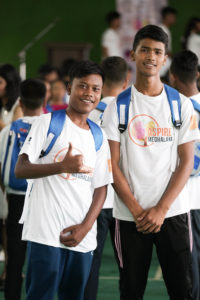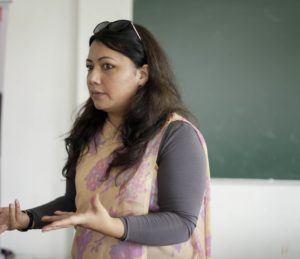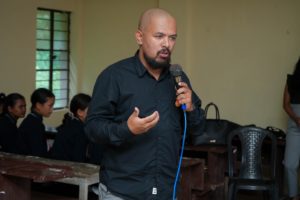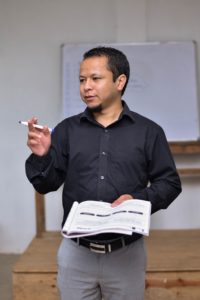By Esha Chaudhuri
With Children’s Day around the corner, concerns and questions on children’s lives and their future endeavours have loomed large in our state. However, many would agree that much difference is made through impactful pedagogy shaping impressionable minds for their all round development. This week, Sunday Shillong brings forth the concerted efforts of Avenues through Aspires’ Graduate Programme touching the lives of many children as building blocks towards their holistic evolution and heightening of self-resilience.
Aspirational learning
 With a focus on youth engagement, the first component of the Aspire programme, the Meghalaya Youth Survey, has captured the sentiments of youth by approaching and engaging young adults between the ages of 14-24 across districts. Launched in March this year, the programme has successfully reached over 64,000 adolescents and young adults through a network of over 320 schools and colleges and over 500 teachers and facilitators.
With a focus on youth engagement, the first component of the Aspire programme, the Meghalaya Youth Survey, has captured the sentiments of youth by approaching and engaging young adults between the ages of 14-24 across districts. Launched in March this year, the programme has successfully reached over 64,000 adolescents and young adults through a network of over 320 schools and colleges and over 500 teachers and facilitators.
The survey domains encapsulated themes such as culture and tradition, skills development, sports, gender equality, inclusion, leadership and environmental issues to name a few.
With an overwhelming response across districts in the State’s largest on-ground youth engagement programme this year, Mark Stone Laitflang, Founder and CEO of Meghalaya based “Avenues” – the Agency implementing ASPIRE Meghalaya, says, “We were moved by the relentless support we received from all corners of the state and the Government, by which we were able to leverage our network and experience over the last two decades to ensure that the focus was on rural and suburban pockets.”
Towards a brighter future
With an initiative based on foundational belief that there is a set of common minimum skills and mind frames for young adults as they graduate and step into the world of work, Aspire Meghalaya aims to impart universally employable soft skills through on-campus Soft Skills and Career Exploration interventions. The modules are specially designed to build Confidence, Clarity of Thought, Communication Skills and Emotional Resilience and work towards career exploration and talent identification through high-impact workshops over a period of 10 days on each campus, for over 13,000 youths in 62 campuses across districts.
 On the question of the curriculum and vision, Mark elaborates, “We call our classrooms ‘safe spaces’ to uncover the genius in each child that would have otherwise been left hidden, dormant or forgotten. Our life coaches and trainers facilitate an environment of learning and create pathways that help our programme participants quickly imbibe shared human values and soft skills needed to thrive in any path of life.”
On the question of the curriculum and vision, Mark elaborates, “We call our classrooms ‘safe spaces’ to uncover the genius in each child that would have otherwise been left hidden, dormant or forgotten. Our life coaches and trainers facilitate an environment of learning and create pathways that help our programme participants quickly imbibe shared human values and soft skills needed to thrive in any path of life.”
Citing some of the determinants for making a student course successful, Faculty member at Aspire, Lucy Momin states, “As mentors, we come across different kinds of individuals. Some are already outspoken and stand out, while some are a tough nut to crack. It is critical for the mentor to build a circle of trust and a comforting environment. Without trust and comfort a student will never open up to their mentor. A key indicator of success to us is self-acceptance and visible confidence in each student.”
Concurring with Momin, Senior Faculty Member, Mac Donald Lyngdoh adds, “Success is ensured when no student is left behind. Some of our best practices include having varied learners in sessions, opportunities for exploring career paths, direct and transparent feedback and rectification, and peer-to-peer and student-teacher counselling for tangible behavioural change.”
With a focus on youth engagement, the exercise captures the voices and sentiments of the youth by approaching and engaging young adults between the ages of 14-24 across districts. Launched in March this year, the programme has successfully reached over 64,000 adolescents and young adults through a network of trained and experienced life coaches, soft skills instructors, operations and logistics experts, data and process specialists, content and media professionals and event managers.
The primary domain encapsulates themes such as culture and tradition, skills development, sports, gender equality, inclusion, leadership environment to name a few. Founder and CEO of Avenues, the Implementation Agency for ASPIRE Meghalaya, Mark Stone Laitflang says, “From the very beginning of this year’s edition of Aspire, we each had our sets of hopes and fears, excitement and uncertainty as we were finding ourselves back after the pandemic to build a generation of empowered youths.”
 Citing some of the determinants for making a student course successful, Faculty member at Aspire, Lucy Momin states, “As mentors we come across different kinds of individuals. Some are already outspoken and out stand the others while some are a tough nut to crack, which is why in a student programme it is very important for the mentor to build a circle of trust and a comforting environment amongst themselves because without trust and comfort a student will never open up to their mentor. The hierarchy between a student and the mentor needs to be minimum to a level that students feel comfortable enough to approach their mentor.”
Citing some of the determinants for making a student course successful, Faculty member at Aspire, Lucy Momin states, “As mentors we come across different kinds of individuals. Some are already outspoken and out stand the others while some are a tough nut to crack, which is why in a student programme it is very important for the mentor to build a circle of trust and a comforting environment amongst themselves because without trust and comfort a student will never open up to their mentor. The hierarchy between a student and the mentor needs to be minimum to a level that students feel comfortable enough to approach their mentor.”
Concurring with Momin, Senior Faculty Member, Mac Donald Lyngdoh adds, “Success is first ensured when no student is left behind. Some set practices include varied learners, drilling certain daily to-dos such as aural repetition after the trainer, being direct and transparent in our rectification approach, followed by peer-to-peer and student-teacher engagement for tangible behavioural change.”
Apart from the enriching personal development modules, Aspire has also strategically integrated a Talent exhibition platform that places the participating campuses at the heart of the programme. Through the schools and colleges, emerging talents from instrumental music to contemporary performances, theatre, body sport, visual arts, sustainable innovations, singing, fine art and wood carving are identified and represented at district talent events.
So far, 62 Campus Talent Events for Aspire participants have been conducted on each Soft Skills campus. 350 amateur talents were selected from the pool of over 13,000 youths trained. These best 20-25 Aspire Talents of the District, were awarded citations and cash prizes at a District Level Talent Event, that were held across the 12 Districts in October and November 2022. The District Talent Selection committees, constituted by the Deputy Commissioners, identified the Top 3 Aspire District Stars at each such event, resulting in a group of 36 remarkable talents from across the State, who will now converge at the ASPIRE State Summit scheduled to be held in December this year, where the Top Aspire State Stars will be recognised.
 Sharing her personal transformational journey as Avenues’ Project Manager for Aspire, Daphishisha Kharhujon says, “Aspire has taught us that each child learns at their own pace and has their own strengths and our responsibility is to celebrate their collective progress irrespective of areas of growth.”
Sharing her personal transformational journey as Avenues’ Project Manager for Aspire, Daphishisha Kharhujon says, “Aspire has taught us that each child learns at their own pace and has their own strengths and our responsibility is to celebrate their collective progress irrespective of areas of growth.”
Teachers and Students Speak
Engaging with some of the primary enforcers – teachers and mentors of the programme, Sunday Shillong delved into the many challenges faced.
Explaining some of them, Head of Training at Avenues, Jasmine Laitflang elaborates, “The primary challenge for trainers was the retention of learning outcomes by each participant, considering that the preferred medium of communication was never English. For this, we put in place a team of devoted Community Trainers who ensured that training was imparted in their mother tongue. The other challenge of sustaining quality engagement and active participation was overcome through our Avenues MECCA Model – Mindsets, Emotions, Communication, Connection and Action strategies. Music also happens to be one of our core pillars to build an atmosphere of harmony, collaborative learning and teamwork.”
Mikaya R Marak, a Class 11 student from Dalu Government Higher Secondary School, spoke of his experience, saying, “As young people, we face challenges like speaking in front of a crowd and communicating with our elders and other people. This programme has taught us how to have confidence in ourselves and in communicating clearly and effectively with others.”
As mentors, teachers themselves have their individual learning curves as they journey this path invariably comparing it to education during their own years. To this, Senior Faculty Member, Preeti Chhetri articulates, “Growing up, the system of learning by rote, being completely absorbed in competing with the rest and always having to maintain a certain academic standard for yourself mattered. It was all about who scored the highest in a particular subject or who was the most intelligent of the lot and intelligence in our time meant acing every paper. Becoming a teacher, then, was not an option but a choice accompanied by a deep calling that went beyond the blackboard.”
Drawing a comparison before and after the inclusion of Aspire’s schedule, Student of Class XII, Tura Government HS School, West Garo Hills, Fiona Vanlalrovi K. Sangma says, “Earlier when there were events in school, I was anxious about volunteering as I was scared of being judged, but the trainers taught me about different emotions and I could try to push beyond fears.”
Student of Class XII, Sawlyngdoh HS School, Mowkaiaw,West Jaintia Hills, Haphidadabiang Phyllei expresses, “I want to become a writer as I love literature, and Aspires helped me overcome nervousness with regards to public speaking and emboldened my confidence to pursue my passion.”
About
Aspire Meghalaya is a unique programme designed for the youth of Meghalaya, focussing on grassroot youth engagement, soft skills training, improving career aspirations, and talent identification. Together with multiple stakeholders across sectors in a convergence-led approach that brings together the Department of Sports and Youth Affairs as the nodal department, the Department of Education, as well as the Ministry of Tribal Affairs as the supporting partners, since its inception in 2019, Aspire Meghalaya has impacted over 85,000 youths across the state.
The Aspires Graduate Programme thus carves a standard that reinvigorates schooling and curriculum building as a crucial aspect of learning and unlearning step after step sculpting attitudes of amplifying one’s strengths, while also embracing their weaknesses.



